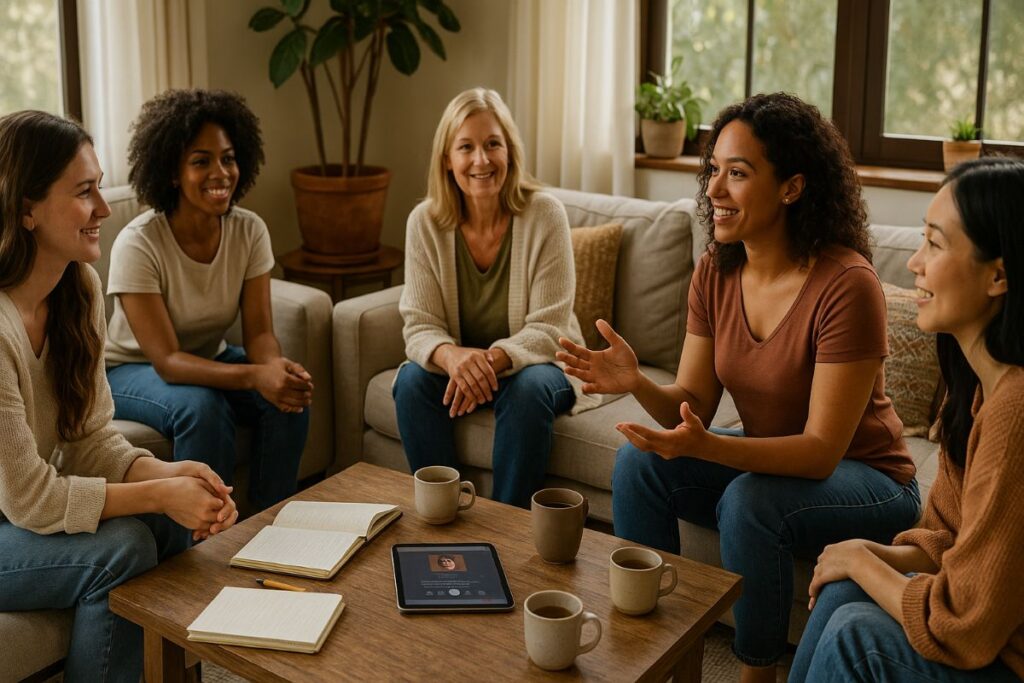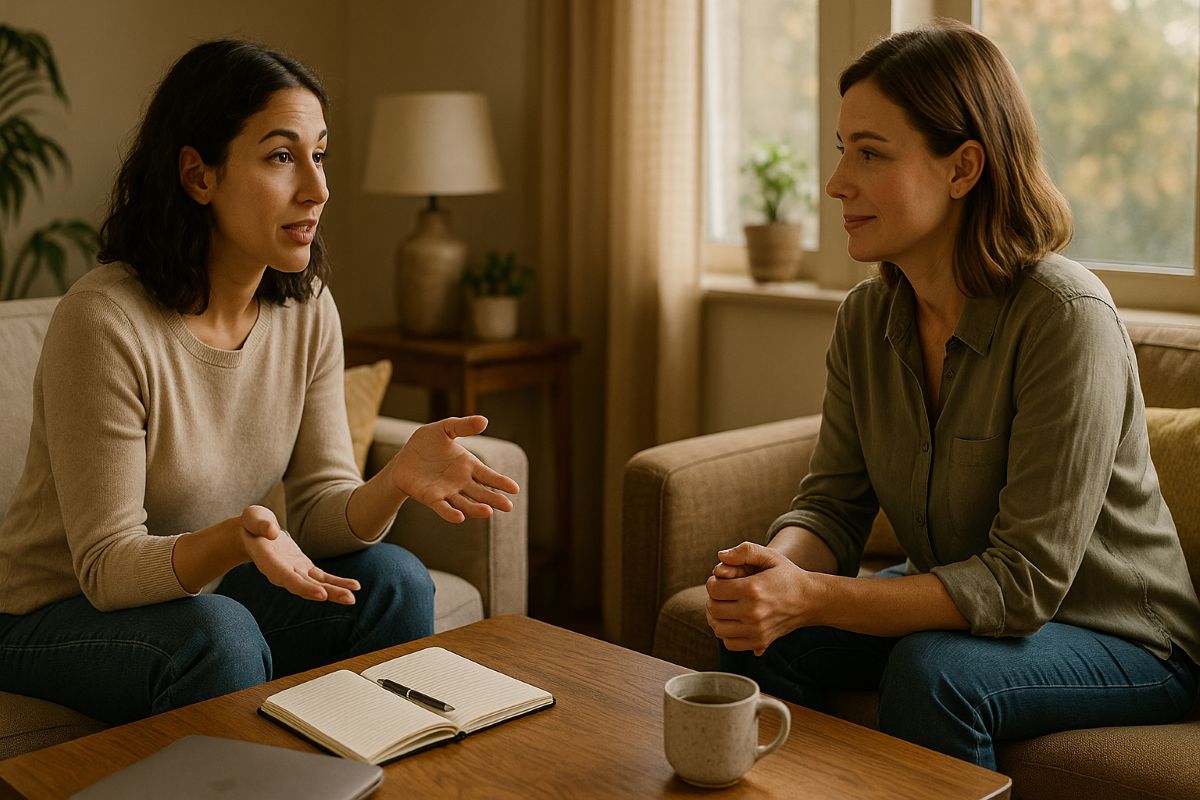Navigating Conversations: Talking to Loved Ones About Your Mushroom Use
Microdosing mushrooms has become a wellness practice that many people—including women seeking calm, creativity, and connection—are exploring.
Yet talking about psychedelics with family, friends, or partners can feel daunting. Misunderstandings and stigma may make loved ones uneasy about the idea.
With gentle guidance and honest communication, you can share your journey in a way that builds trust and understanding while still protecting your boundaries.
This guide offers practical advice rooted in research and personal experience to help you open up about your mushroom use.
In This Article
Understanding Microdosing and Psychedelics
Communication Strategies for Talking About Psychedelics
Sharing the Research and Addressing Concerns
Navigating Stigma and Building Understanding
Supporting Each Other and Finding Community
Safety, Legality, and Responsible Use
Frequently Asked Questions (FAQ)
Conclusion: Opening Hearts and Minds
Understanding Microdosing and Psychedelics

What are microdosing and psilocybin?
Microdosing involves taking very small amounts of psilocybin—one‑tenth to one‑twentieth of a standard dose.
Psilocybin is a naturally occurring compound in certain mushrooms that can influence mood and perception. At low doses, many people report feeling more focused, creative, and emotionally balanced.
Surveys of thousands of microdosers found they often experience lower levels of anxiety, depression, and stress compared to non‑microdosers.
These benefits may be particularly appealing to women juggling work, family, and personal growth.
What does the research say?
Scientific interest in psilocybin has grown rapidly. In a 2016 study with people facing advanced cancer, a single high dose of psilocybin significantly improved mood and reduced fear of death.
A randomized double‑blind trial later showed that high‑dose psilocybin caused substantial and sustained decreases in depression and anxiety for most participants.
The U.S. Food and Drug Administration has granted “breakthrough therapy” status for psilocybin‑assisted therapy in major depressive disorder.
Despite these promising results, microdosing research remains limited, and some people report side effects such as anxiety, insomnia, or nausea.
Understanding both benefits and risks prepares you to speak knowledgeably with loved ones.
Motivations for women.
Women often seek microdosing to support mental health, enhance creativity, and improve their connection with themselves.
In a large survey, most microdosers said they were motivated by health and wellness.
For women who may shoulder caregiving roles, microdosing can offer a sense of empowerment and self‑care.
Explaining your motivations honestly can help loved ones see why this practice matters to you.
Why People Choose Microdosing
Wellness benefits
Many choose microdosing because of its potential to ease anxiety and depression. The same survey noted above found microdosers experienced lower levels of these symptoms.
High‑dose psilocybin therapy has also demonstrated rapid, long‑lasting improvements in mood compared with traditional antidepressants.
The idea that a natural mushroom could help mental well‑being resonates with people seeking alternatives to pharmaceuticals.
Creativity and spirituality
Some women report that microdosing sparks creativity, increases focus, and deepens their spiritual or artistic practices.
Connecting with nature and experiencing subtle shifts in perception can feel inspiring and uplifting.
Community and empowerment
The act of microdosing can foster a sense of community among women who share similar experiences.
By joining support groups or programs, women find encouragement and learn from one another’s journeys.
Knowing you are part of a larger movement can make conversations with family easier because you feel less alone.
Preparing for the Conversation
Reflect on your “why.” Before approaching a loved one, take time to articulate your reasons for microdosing.
Ask yourself: What benefits have you felt? What concerns might your family have? Being clear about your intentions builds confidence.
Pick the right moment – Choose a calm, private setting where you both have time to talk. Avoid starting the conversation during holidays or high‑stress events where emotions run high.
Body language matters – Keep an open posture, maintain eye contact, and speak calmly. This non‑verbal communication can reduce tension and help your loved ones feel safe. If you notice yourself becoming defensive, pause and take a breath. Kindness and patience go a long way.
Approach vs. avoid behaviours.
| Approach | Avoid |
| Use open body language, lean in, and smile. | Crossing arms or avoiding eye contact. |
| Start with “I” statements that focus on your experience. | Accusing language such as “You never listen.” |
| Share a balanced view of benefits and risks. | Making exaggerated claims or downplaying concerns. |
| Listen and paraphrase. | Interrupting or dismissing feelings. |
Set boundaries – You are not obligated to share everything. Decide ahead of time how much detail you are comfortable disclosing. It is okay to say, “I’m not ready to discuss that yet” or “I’d prefer to focus on what this has meant for my mental health.”
Communication Strategies for Talking About Psychedelics
Use comfortable language. The way you describe your practice can shape how it is received. Instead of saying “I’m taking drugs,” you might explain that you’re following a microdosing protocol using a very small amount of mushrooms to support your wellness.
Avoid jargon or slang that could confuse or alarm loved ones. Use simple terms that are easy to understand.
Listen actively
When loved ones ask questions or express concerns, show that you hear them. One helpful framework involves paraphrasing their words, offering a compliment (praise), pivoting to your perspective, and probing with curiosity.
For example, if a parent says, “I’m worried it’s unsafe,” you could reply, “I appreciate that you care about my well‑being.
I’ve researched the risks and benefits, and here’s why this is important to me. What questions do you have?”
Keep the tone light
Humour and warmth can ease tension. If the conversation becomes heavy, share a lighthearted story or memory. Remind them that microdosing is part of a balanced self‑care routine, not a rebellion.
Do’s and don’ts
Do:
- Speak from personal experience rather than telling others what to believe.
- Share credible research in simple terms, including studies that show improved mood and quality of life.
- Ask open‑ended questions to understand your loved one’s concerns.
- Acknowledge both benefits and risks.
Don’t:
- Lecture or try to “convert” people.
- Overwhelm them with too much technical data at once.
- Dismiss fears or change the subject abruptly.
- Engage in heated arguments—take breaks if needed.
When scepticism arises
Loved ones may have preconceived notions about psychedelics. If someone says, “Aren’t mushrooms dangerous?” you might respond, “It’s important to use them responsibly.
At very small doses, many people report positive effects on mood and creativity. Scientists have found that psilocybin therapy helps some people with depression.
But I also understand there are risks, and I’m taking steps to be safe.”
Sharing the Research and Addressing Concerns
Highlight clinical studies
Real stories are powerful, but evidence adds credibility. You can mention that researchers at Johns Hopkins University studied people with advanced cancer and found that a single high dose of psilocybin improved mood and reduced fear of death.
A later randomized trial showed that high‑dose psilocybin significantly lowered depression and anxiety and increased life meaning for most participants.
These benefits were sustained for months. Remember to explain that these studies used controlled environments and professional support.
Discuss microdosing research
Surveys indicate that many microdosers experience lower levels of depression, anxiety, and stress.
However, microdosing research is still emerging, and scientists caution that it may not be safe for everyone.
The FDA recognises psilocybin therapy as a potential breakthrough for major depressive disorder, but self‑medication outside of clinical settings carries risks.
Address risks honestly
Some people experience side effects like anxiety, nausea, or insomnia when microdosing. Self‑reported surveys have found that about 11 percent of psilocybin users experienced persistent negative effects.
People with heart conditions or a history of psychosis should avoid psilocybin. When you acknowledge these risks, you build trust.
Answer common concerns
Loved ones may worry about legality, addiction, or losing control. Explain that psilocybin is still a Schedule I substance in many countries and should be approached carefully.
Remind them that microdosing uses very small amounts and does not produce the hallucinogenic experiences associated with larger doses.
Encourage them to research credible sources and ask questions.
Navigating Stigma and Building Understanding
- Separate microdosing from recreational misuse – One reason people react strongly to psychedelics is a lack of distinction between responsible use and recreational abuse. Emphasise that microdosing is about wellness and mental health, not escaping reality.
- Educate on history and policy – Many mushrooms have been used in traditional cultures for centuries. Modern Western society banned psilocybin decades ago, leading to stigma.
In recent years, medical research has regained interest, and some cities and states have decriminalized or legalized psychedelics for therapeutic use.
This context can help loved ones understand why your choice feels less radical than they might think. - Gendered expectations – Women may face unique scepticism when discussing psychedelics.
Societal expectations often label women as nurturers and question their decision to try non‑traditional wellness practices.
Remind yourself that your self‑care journey is valid and that you deserve support. Sharing stories from other women or citing research about women’s health motivations can be empowering. - Reframing the narrative – Instead of focusing on illegal drugs, focus on self‑care, mindfulness, and empowerment.
For example: “Microdosing is part of my wellness routine, similar to meditation or yoga. It helps me stay present and balanced.” This framing can shift the conversation from fear to curiosity.
Supporting Each Other and Finding Community

Invite loved ones to learn
Offer to share articles or podcasts so they can explore the topic at their own pace. Encourage them to come to you with questions.
Create a support network
Joining groups or communities—especially women‑focused ones—can offer guidance, accountability, and a sense of belonging.
Sharing experiences with others can also provide ideas for how to talk to different types of family members.
Explore our microdosing products
If you are ready to introduce your loved ones to the practical side of microdosing, consider sharing information about the blends you use. My Sugar Magnolia’s products are designed to support women seeking gentle and consistent experiences:
- Capsules: Our microdosing capsules are perfect for precision dosing. Each capsule contains a balanced blend to support mood and focus. Learn more about how the capsule blend can fit into your routine.
- Chocolate Bar: The Albino A+ and Penis Envy chocolate bar pairs delicious flavour with a proprietary mushroom blend. It is an easy way to incorporate microdosing into self‑care rituals and makes for a discreet treat.
- Gummies 500: For a convenient option with a slightly higher dose, our 500 mg gummies offer a tasty experience that can be divided for microdosing. They are great for travel or busy days.
- Gummies: These micro‑dose gummies are ideal for those new to mushrooms. They provide a gentle introduction and can be part of a mindful routine.
Join the Sugar Mama program
For women seeking deeper connection, our Sugar Mama membership offers personalized support, exclusive discounts, and a loving community.
By joining, you gain access to guidance, ongoing education, and a network of women committed to self‑care.
Encourage loved ones to explore this program so they see the supportive environment you have chosen.
Safety, Legality, and Responsible Use
Know the law
Psilocybin remains illegal under federal law in many countries, including the United States. Some states and cities have decriminalized or legalized its use for therapy. Ensure you understand the local laws and never cross legal boundaries.
Consult professionals
Before starting microdosing, talk to a healthcare provider—especially if you have a pre‑existing condition or take medications. Some people with psychosis or cardiovascular issues should avoid psilocybin. A professional can help you assess whether microdosing is appropriate.
Start low and go slow
If you choose to microdose, begin with a very small amount. Document how you feel over several days. Adjusting slowly helps you understand how your body reacts. Many protocols suggest microdosing every other day or following a schedule like “one day on, two days off.” Listen to your body and take breaks when needed.
Be mindful of side effects
While microdosing may improve mood and focus, some people experience side effects such as anxiety, restlessness, or difficulty sleeping. If adverse effects occur, stop and reassess.
Consider therapy
Psychedelic‑assisted therapy, guided by trained professionals, can provide a safe environment for higher doses.
Research shows such therapy may reduce depression and anxiety. Working with professionals ensures you have support during the experience.
Frequently Asked Questions (FAQ)
How do I microdose safely?
Start with a very small dose (one‑tenth to one‑twentieth of a full dose). Microdose every other day or follow a schedule like one day on, two days off. Keep a journal, listen to your body, and consult a healthcare provider.
What if my family is strongly against psychedelics?
Stay calm and respectful. Share your reasons and the research behind your decision. Acknowledge their concerns and reassure them that you are using very small amounts. You can also suggest that they learn about the science behind psilocybin therapy and invite them to read resources together.
Are there long‑term effects of microdosing?
Studies on long‑term microdosing are limited. Some surveys suggest microdosing has lower depression and anxiety, but more research is needed. It is important to take breaks and monitor your mental and physical health.
Conclusion: Opening Hearts and Minds
Starting a conversation about your mushroom use doesn’t have to be stressful. By understanding the science, clarifying your motivations, and approaching loved ones with compassion and openness, you can create a supportive dialogue.
Share research showing the benefits and risks, listen actively, and respond with warmth. Remind your family that your practice is rooted in wellness and self‑care.
Inviting them to learn more, exploring microdosing products together, and joining the Sugar Mama program can turn scepticism into curiosity and even solidarity.
Your journey is unique, and with thoughtful communication, your loved ones can become allies rather than obstacles.

